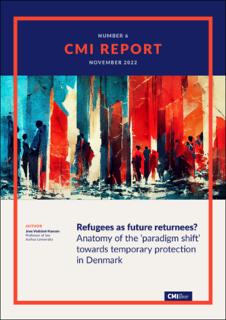Refugees as future returnees? Anatomy of the ‘paradigm shift’ towards temporary protection in Denmark
Research report
Permanent lenke
https://hdl.handle.net/11250/3034179Utgivelsesdato
2022-11-01Metadata
Vis full innførselSamlinger
- Publications [1488]
Originalversjon
Bergen: Chr. Michelsen Institute (CMI Report 2022:6) 44 p.Sammendrag
The ‘paradigm shift’ in Danish asylum policy, officially introduced in 2019, implied the adoption of quasi-mandatory rules on revocation of asylum residence permits as soon as the circumstances in the country of origin are supposed to have changed so as to bring the need for protection to an end. However, these changes were an extension of the tendency towards temporariness of refugee protection in Denmark that started already in 2015 with the introduction of temporary protection status and expansion of the scope of revocation of residence permits for large groups of refugees, primarily those who fled generalised risks in Somalia and Syria. This report describes these policy changes and identifies problematic issues in the implementation of the ‘return turn’ in Danish asylum law. Some of these issues are linked to politicised implementation of the legislation that created the basis for focusing on return of refugees to their country of origin. While the number of refugees whose residence permits have actually been revoked or denied extension is rather low compared to the number of persons who have been subject to review of their continued need for protection, the ‘paradigm shift’ has caused legal and human uncertainty for especially Syrian refugees. As Denmark currently does not deport persons to Syria, the decisions to end protection are likely to create irregular situations for an unknown number of affected persons, either in Denmark or in neighbouring countries to which some of them move on from Denmark.
